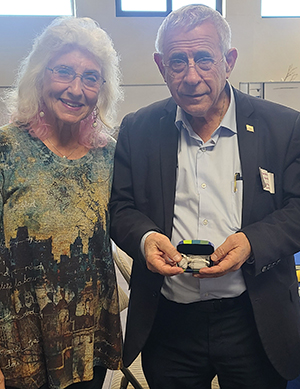By Miriam Gershenson


SAN DIEGO – Jewish community leaders gathered at the San Diego Jewish Academy for a unique and insightful luncheon Wednesday, Nov. 20, hosted by Pamela Nathan, president of SAJAC (South African Jewish American Community) and CAN (Combat Antisemitism Now). The event was designed to provide an opportunity for local leaders to hear from Dr. Mordechai Kedar, a renowned scholar and expert on Middle Eastern affairs. Kedar, a senior lecturer at Bar-Ilan University, is widely recognized for his deep understanding of the ideologies driving the Middle East, particularly in relation to antisemitism and Israel.
Kedar spoke on several pressing issues, offering his perspective on the roots of hatred toward Jews, the ideological dynamics within Islam and Christianity, and the complex realities of the Middle Eastern geopolitical landscape.
His lecture took a deep dive into the history and ideology behind the hatred of Jews, tracing it back to early religious tensions among Judaism, Christianity, and Islam. He argued that for centuries, antisemitism has been used to justify the roles and legitimacy of Christianity and Islam in the world today. According to Kedar, Christianity’s claim to spiritual superiority and Islam’s assertion of its own finality in religious truth have been at the heart of the historical rejection of Judaism.
One of the more startling points Kedar made was his analysis of the Islamic perspective on Jews. He explained that within Islamic teachings, there are numerous unfavorable references to Jews, including a particular historical practice of humiliation. Jews were required to pay a special tax, known as the “Jizya,” while in a state of humiliation, a practice in which Jews were forced to crawl to the treasury and hand over their payment while being physically kicked. This, Kedar emphasized, was not just a cultural practice but rooted in Islamic doctrine, as described in the Quran.
Kedar also pointed out that the yellow star, which the Nazis used to identify Jews during the Holocaust, actually originated in Baghdad long before it was adopted by the Nazis. He explained that Jews were marked for degradation, something that was ingrained in many societies under Islamic rule.
He also touched upon the Islamic rejection of the legitimacy of Judaism. Kedar emphasized that Islam views Judaism as having been nullified twice—first by Christianity and then by Islam itself. This ideological framework, Kedar argued, underpins much of the hostility toward Israel and the Jewish people in the Middle East today. According to this belief, the existence of Jews with their own land, military, and rights is an incomprehensible anomaly to the Islamic world.
Kedar also provided an insightful critique of the failure of Western policies in the Middle East. Using the metaphor of trying to fix a Chevrolet in a Mercedes garage, he argued that Western ideals, such as democracy and individual freedoms, simply do not align with the cultural and religious realities of the Islamic world. The concept of freedom of religion, freedom of speech, women’s rights, and LGBTQ+ rights are fundamentally at odds with Islamic law, he explained. In many Islamic countries, these freedoms do not exist, and their violation is often met with harsh punishment, including imprisonment and even death.
He pointed out that the failure of U.S. interventions in countries like Iraq, Afghanistan, and Somalia was due to the imposition of Western ideals onto societies that were not ready or willing to accept them. The same can be said for the wider Middle East. The idea that Israel’s conflict with Palestine is the root of all Middle Eastern problems, he argued, is a narrow and misleading perspective. Dr. Kedar highlighted conflicts in Algeria, Libya, Sudan, Syria, and other parts of the region, pointing out that the instability in these countries cannot be blamed solely on the Israeli-Palestinian conflict. He emphasized that the Middle East is a region deeply fractured by internal divisions, and Israel’s existence is but one small part of the much larger and more complex issues facing the region.
The luncheon was attended by 15 influential Jewish community leaders, both local and national, all of whom were eager to engage with Dr. Kedar’s thought-provoking perspectives. The room was filled with deep respect for the speaker’s knowledge, and the discussions that followed were both lively and enriching.
Attendees asked a variety of questions, ranging from the implications of Kedar’s analysis on current geopolitical strategies to the ways in which Jewish communities can better understand and respond to the challenges posed by ideological extremism. Dr. Kedar addressed each question with thoughtfulness and clarity, offering detailed explanations and expanding on the nuances of his argument.
A humorous moment provided some light relief during the event when the room’s automatic lighting system, set on a timer, would occasionally turn off. I was tasked with getting up repeatedly to reset the lights, which added an unexpected but amusing touch to the gathering.
As the host and the person responsible for bringing Dr. Kedar to San Diego, Pamela Nathan played a crucial role in making the luncheon and the entire visit a success. Pamela, a leader in both SAJAC and CAN, was instrumental in organizing Dr. Kedar’s itinerary, which included two lectures to high school seniors earlier in the day, multiple interviews with reporters, and a public lecture later that evening. Her careful planning ensured that Dr. Kedar’s visit had a broad impact, reaching a wide audience of both community leaders and the general public.
Reflecting on the event, I felt an overwhelming sense of gratitude to have been part of such an incredible gathering. The opportunity to sit in the same room as so many accomplished and inspiring individuals who are actively making a difference in the Jewish community was truly humbling. Dr. Kedar’s lecture opened my eyes to a deeper understanding of the complex dynamics at play in the Middle East, and I left the luncheon feeling more informed and motivated to engage in further dialogue on these critical issues.
The luncheon with Dr. Kedar was not only a rare opportunity to hear from a renowned expert on the Middle East but also a reminder of the strength and influence of the Jewish community. Pamela Nathan’s leadership in organizing this event made it a resounding success, and it served as an important moment for all attendees to expand their understanding of the ideological and geopolitical challenges facing Israel and the Middle East. For me, this luncheon was a powerful reminder of the importance of coming together as a community to share knowledge, discuss important issues, and work toward a more informed and engaged future.
Miriam Gershenson is a freelance writer who enjoys covering events and promoting others,
Pingback: Israeli Scholar Proposes '8-Emirates Solution' for Palestinians - San Diego Jewish World
Thank you for such a detailed and insightful recap of Dr. Mordechai Kedar’s lecture. It’s fascinating to see how historical and ideological contexts continue to shape modern perspectives and conflicts. The critique of Western policies in the Middle East and the clarification about the broader challenges beyond the Israeli-Palestinian conflict were particularly eye-opening. Events like this remind us of the importance of knowledge, dialogue, and community in addressing these complex issues. Kudos to Pamela Nathan for organizing such a meaningful gathering!